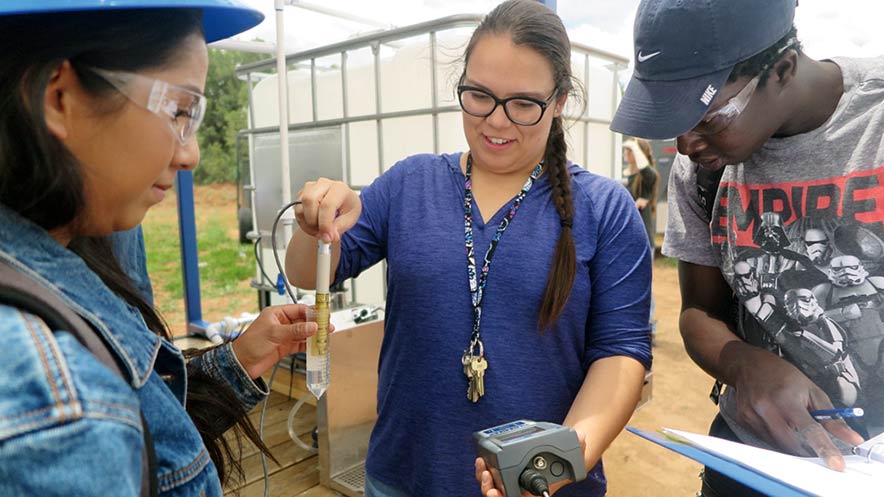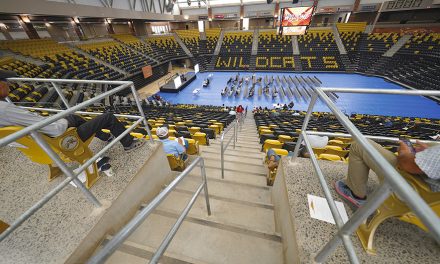
UArizona, Diné College to train next generation of Navajo water scientists
By Rosemary Brandt
College of Agriculture and Life Sciences
TUCSON
The University of Arizona and Diné College have been awarded a $500,000 grant from the U.S. Department of Agriculture to collaboratively train the next generation of Navajo water scientists.
The grant comes from the USDA National Institute of Food & Agriculture through the Tribal College Research Grant Program and will provide Navajo youth technical and hands-on experience in microbiology, molecular biology, chemical and microbial water analysis, and pressure-driven membrane processes.
Through the collaborative research program, students at Diné College – a public tribal college in northern Arizona – will also learn about traditional and advanced water and wastewater treatment procedures.

UArizona | Torran Anderson
UArizona graduate student Marisa Gonzalez, an Indigenous Food, Energy and Water Security and Sovereignty trainee, takes a conductivity measurement with Diné College students in Tsaile, Ariz., in June 2019.
Shazia Tabassum Hakim, principal investigator on the grant and a professor of microbiology and biomedical sciences in the Diné College School of Science, Technology, Engineering, & Math, said, “Water scarcity is increasing day by day, and we need our own Navajo water scientists who understand the traditional values associated with water and its importance.”
Vasiliki Karanikola, UArizona’s principal investigator on the project and an assistant professor of chemical and environmental engineering, said, “Providing STEM tools and opportunities to Native American college students to understand and solve emerging water challenges is very important, as it creates a new generation of scientists and engineers ready to address water challenges within their own communities.”
Each year, six Diné College juniors will be trained through a 10-week internship, and two seniors will be given the opportunity to work alongside Hakim as research assistants.
The first cohort will begin virtually this fall, with plans to provide in-person opportunities at both land-grant institutions in the program’s second and third year.
The goal of the internship program is to provide the skills, knowledge, and experiences necessary to prepare student interns and research assistants for STEM career paths.
Benita Litson, Diné College land-grant director and co-investigator on the project, said through the three-year program, a team of experts from both institutions will focus on water sustainability, particularly potential reuse applications for polished effluent, which is wastewater that’s gone through its final treatment stage.
The team will identify and address the possible presence of microbial and chemical contaminants in treated wastewater, the use of pressure-driven membrane filtration systems to polish effluent before reuse, and potential technical impediments to agricultural use of polished effluent.
Karletta Chief, co-principal investigator on the grant and a professor of environmental science in the UArizona College of Agriculture and Life Sciences, said, “Arizona is in a long-term drought, and water resources will continue to decline. It is imperative that innovative ways of water recycling and conservation be explored.”
Hakim said, “In Navajo culture, water has integral value in day-to-day life. Hence, this study will be conducted as a baseline research project with a focus on training our students to help support the best interests of the Navajo Nation. At the same time, our results will be available to communities outside the reservation for guidance and utilization.”
The team will collect wastewater samples from research sites in Tuba City and Chinle. Research results will inform potential policy initiatives to be developed in collaboration with tribal stakeholders, including the Navajo Tribal Utility Authority, Navajo Nation Environmental Protection Agency, Navajo Nation Water Resource Department and the Navajo Nation Department of Health.
Daniel Tso, chairman of the Health, Education and Human Services Committee of the Navajo Nation Council, said, “The inception and engagement of our Diné College students will lead to necessary data that will serve as a basis for further program development.
“The students will gain knowledge that can help guide their coursework, their degree attainment and their career choices,” he said. “We welcome this type of collaboration that will empower the younger generation.”







 Highway 264,
Highway 264, I-40, WB @ Winslow
I-40, WB @ Winslow